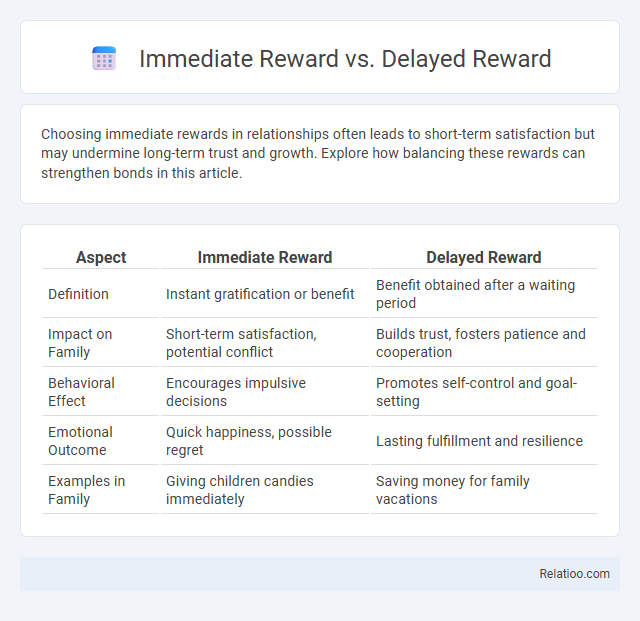Choosing immediate rewards in relationships often leads to short-term satisfaction but may undermine long-term trust and growth. Explore how balancing these rewards can strengthen bonds in this article.
Table of Comparison
| Aspect | Immediate Reward | Delayed Reward |
|---|---|---|
| Definition | Instant gratification or benefit | Benefit obtained after a waiting period |
| Impact on Family | Short-term satisfaction, potential conflict | Builds trust, fosters patience and cooperation |
| Behavioral Effect | Encourages impulsive decisions | Promotes self-control and goal-setting |
| Emotional Outcome | Quick happiness, possible regret | Lasting fulfillment and resilience |
| Examples in Family | Giving children candies immediately | Saving money for family vacations |
Understanding Immediate vs Delayed Rewards
Understanding immediate vs delayed rewards reveals how your brain evaluates gratification and motivation; immediate rewards trigger instant pleasure, while delayed rewards cultivate long-term satisfaction and self-control. Studies in behavioral economics and psychology show that individuals who prioritize delayed rewards typically achieve better outcomes in personal finance, health, and productivity. Balancing immediate and delayed rewards can enhance decision-making strategies, optimizing your ability to achieve sustained goals.
The Psychology Behind Reward Timing
The psychology behind reward timing reveals that immediate rewards activate the brain's dopamine system more intensely, enhancing motivation and reinforcing behavior faster than delayed rewards. Delayed rewards often require greater self-control and engage the prefrontal cortex, supporting long-term goal achievement despite the temptation of short-term gratification. Understanding the neural mechanisms of reward timing can optimize behavioral interventions and improve decision-making strategies by balancing immediate satisfaction and future benefits.
Instant Gratification: Pros and Cons
Immediate reward offers instant gratification by providing quick satisfaction, which can boost motivation and reinforce positive behavior rapidly. Delayed reward, on the other hand, promotes patience and long-term goal achievement by encouraging you to wait for a more substantial benefit, enhancing self-control and resilience. Balancing these rewards is crucial, as immediate rewards may lead to impulsive decisions while delayed rewards require sustained effort and discipline for greater success.
Delayed Gratification: Benefits for Long-Term Success
Delayed gratification, the ability to resist immediate rewards in favor of larger, long-term benefits, significantly enhances goal achievement and personal development. Studies show that individuals practicing delayed gratification tend to exhibit better academic performance, improved emotional regulation, and higher financial stability over time. This self-control mechanism strengthens decision-making skills, fostering resilience and sustained motivation crucial for long-term success.
How the Brain Responds to Rewards
The brain's response to immediate rewards is characterized by rapid activation of the ventral striatum and dopamine release, reinforcing quick gratification. Delayed rewards engage the prefrontal cortex more heavily, supporting planning and impulse control by evaluating future benefits. Overall, the reward system balances these neural pathways to influence decision-making and motivation in different temporal contexts.
Real-Life Examples of Reward Timing
Immediate rewards, such as receiving a paycheck after a day's work or enjoying a hot meal right after cooking, provide instant gratification that reinforces positive behavior quickly. Delayed rewards, like saving money for a vacation or studying for a degree, require patience but often yield more substantial and lasting benefits. Your ability to balance immediate and delayed rewards influences decision-making and long-term success in real-life scenarios.
Self-Control and Its Role in Reward Choices
Self-control plays a critical role in reward choices by enabling individuals to forgo immediate rewards in favor of larger delayed rewards, which often lead to greater long-term benefits. The capacity to delay gratification is linked to better decision-making and enhanced emotional regulation, reflecting the brain's executive functions. Understanding the neural and psychological mechanisms behind immediate versus delayed reward preference highlights the importance of self-control in achieving personal goals and maintaining overall well-being.
Immediate Rewards in Modern Society
Immediate rewards in modern society, such as instant notifications, quick purchases, and fast entertainment, strongly influence decision-making by providing instant gratification that reinforces behavior rapidly. These rewards activate the brain's dopamine system, creating a powerful feedback loop that can sometimes undermine long-term goals by prioritizing short-term pleasure over delayed benefits. Your ability to balance immediate rewards with delayed rewards is crucial for achieving sustained success and well-being amidst the prevalence of instant access technologies.
Strategies to Cultivate Patience for Delayed Rewards
Strategies to cultivate patience for delayed rewards include practicing mindfulness techniques to enhance self-control and reduce impulsivity, setting clear long-term goals to maintain motivation, and using visualization methods to focus on the benefits of future gains rather than immediate gratification. Implementing incremental milestone rewards helps reinforce progress while training the brain to tolerate delays. Cognitive-behavioral approaches that reframe the value of waiting can strengthen decision-making skills, promoting preference for delayed, often larger, rewards over immediate but smaller incentives.
Choosing the Right Reward System for Your Goals
Choosing the right reward system for your goals depends on understanding Immediate Reward, which provides quick gratification, and Delayed Reward, offering greater long-term benefits. Immediate rewards can boost motivation in short-term tasks, while delayed rewards enhance discipline and sustain effort towards larger objectives. Your decision should align with the nature of your goals and the behavior change you intend to reinforce for optimal success.

Infographic: Immediate Reward vs Delayed Reward
 relatioo.com
relatioo.com